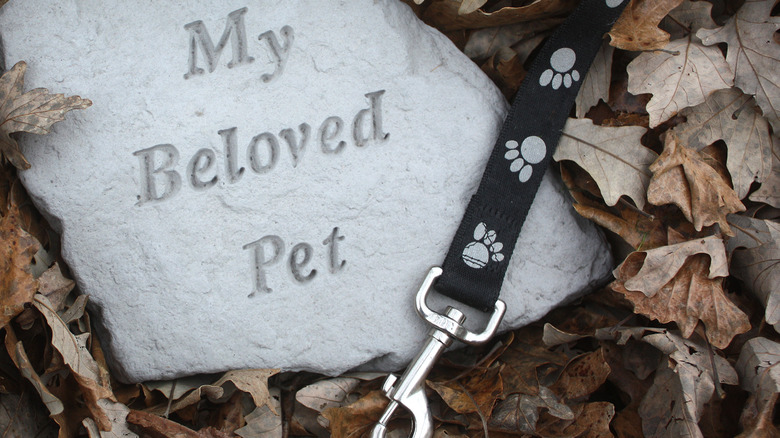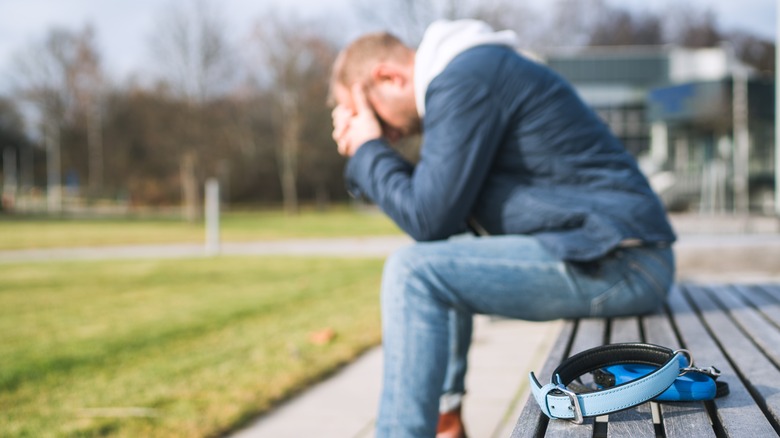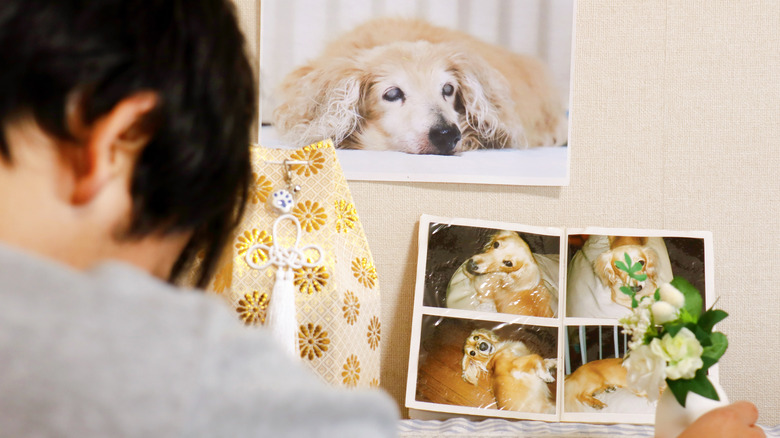What Not To Say When Someone's Pet Dies
Losing a pet is devastating. For many of us, our pets are beloved family members and cherished companions. Pets not only offer unconditional love but can also help us cope with stress, depression, and loneliness. What's more, pet parents tend to be healthier and happier than the average person (per CNN). The simple act of touching them brings a sense of calm and relieves anxiety. This kind of relationship is often more satisfying than interacting with another human being, suggests a study featured in "Evolution and Human Behavior" (via ScienceDirect).
Many pet owners experience feelings of guilt and emptiness, anxiety, depression, bad sleep, and social isolation when their fur baby passes away. Some also develop eating disorders or self-harm behaviors, and about one-third end up dealing with severe grief, according to clinical research published by the Journal of Veterinary Medical Science in the National Library of Medicine. Their friends, especially those who've never had a pet of their own, may look at them with a critical eye instead of showing empathy and support.
Grieving a pet can be just as painful as mourning the loss of any other family member. This experience can be even more traumatic when a pet dies unexpectedly or has to be euthanized. In such cases, their human parents may feel guilty, wondering if there was anything they could have done to prevent the loss of their beloved companion. As a friend, it's important to be supportive and weigh your words before you speak.
The worst things you can say to someone grieving a pet
Sometimes, people say hurtful things to those grieving the loss of a pet — despite trying to help. For example, you may be told that "He was just a dog," "You can always get another pet," or "It's not like you lost a child." Other remarks, such as "Your pet is in a better place now," or "Time heals all wounds" are just as inappropriate. A pet is not a toy you can replace. Their human companions may think of them as a child or best friend, and losing them can leave an empty place in their lives, explains Psychology Today. They may get a new pet sooner or later, but they won't replace the one they lost.
Refrain from asking silly questions like, "Are you still upset about your pet?" Grief often lasts for months or even years, and it's not something you can "get over," says the American Academy of Family Physicians. Bereaved pet owners may begin to feel better over time, but they'll still experience ups and downs. Small things, such as seeing someone walking a dog or finding their pet's collar in a drawer, can trigger painful memories. That's when they realize they'll never go on a walk with their beloved friend again or put the collar around their neck. It's like a constant reminder of their loss and the life they once had.
How to support a grieving friend
When someone's pet has died, their friends may say things like, "He had a long life — be thankful for that" or "I know how you feel." What they don't understand is grief is different for everyone. Perhaps you've lost a pet yourself, but this doesn't mean you know how your friend feels. Plus, it doesn't matter whether his pet lived for 10 months or 10 years — the pain of losing him is just as strong. Also, don't tell your friend that now he can finally travel more or focus on his hobbies. That's the last thing he wants to hear.
What you should do instead is let your friend know you're there for them. Remind them about the beautiful moments they shared with their pet, listen without judgment, and show you care. Give your friend the time to mourn and don't push them into trying new things, such as going on trips or starting a hobby. If your schedule allows for it, offer to help them with grocery shopping, house cleaning, and other chores, as suggested by the University of Florida Health.
Reassure your friend that their feelings are perfectly normal. Meanwhile, seek ways to help them celebrate the life of their pet, says Washington State University. For example, you could send them a memorial gift, make a scrapbook or photo album, or plant a tree in memory of their pet. What matters most is to be kind and offer your unconditional support.


